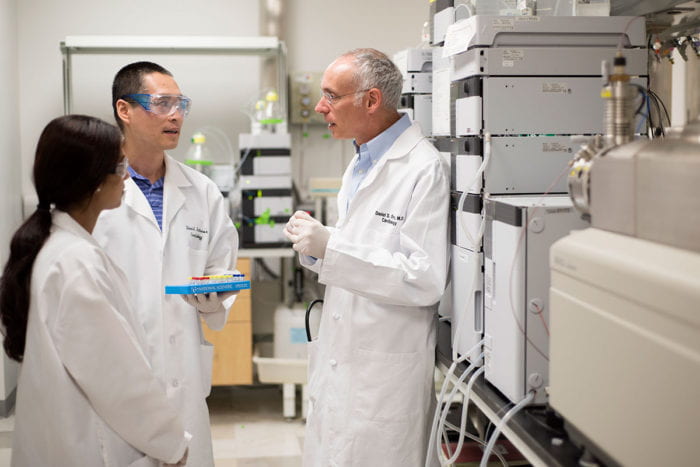Mass Spectrometry Core
This Core provides rigorous mass spectrometry analyses to Diabetes Research Center (DRC) investigators that include quantification as well as structural characterization of diabetes-related biomolecules. The Core increases efficiency and cost effectiveness by providing centralized, standardized analyses to study molecular mechanisms of the pathogenesis of diabetes, its risk factors, and its complications. A major goal of the Core is to promote use of mass spectrometry methods in diabetes research by efforts in training, collaboration, development, service, and dissemination.
This Core provides rigorous mass spectrometry-based proteomics and metabolomics analyses to DRC investigators that include quantification, structural characterization, and functional characterization of diabetes-related biomolecules. The Core increases efficiency and cost effectiveness by providing centralized, standardized mass spectrometry analyses to study molecular mechanisms of the pathogenesis of diabetes, its risk factors, and its complications. A major goal of the core is to promote use of mass spectrometry (MS) methods in diabetes research through training, collaboration, development, service, and dissemination.

Specific objectives of the Core are
1. To provide and maintain functional mass spectrometry systems for diabetes-related studies;
2. To consult with DRC investigators regarding how MS can advance their research programs
3. To perform service-related MS analyses for diabetes investigators, such as quantifying target analytes, obtaining spectra for structural identification, and assisting with mass spectra interpretation;
4. To develop new MS methods; and
5. To provide training to students and fellows in principles and use of MS systems.
Contacts

M. Ben Major, PhD, Core Director
Alan A. and Edith L. Wolff Professor of Cell Biology and Physiology
Department of Cell Biology & Physiology, Department of Otolaryngology
4523 Clayton Avenue, Campus Box 8228
402 McDonnel Sciences
St Louis, MO 63110
Phone 314-273-3669
Email bmajor@wustl.edu

Xuntian Jiang, PhD, Associate Director, Metabolomics
Assistant Professor of Medicine
Division of Endocrinology, Metabolism & Lipid Research
660 S. Euclid Ave., MSC 8086-0004-10
St Louis, MO 63110
Phone 314-273-4679
Email jiangxuntian@wustl.edu

Young Ah Goo, PhD, Associate Director, Proteomics
Director, Mass Spectrometry Technology Access Center (MTAC)
Professor, Department of Biochemistry and Molecular Biophysics, Department of Genetics
4444 Forest Park Avenue
St. Louis, MO 63108
Phone 314-273-3487
Email ygoo@wustl.edu

Fong-Fu Hsu, PhD, Associate Director, Mass Spectrometry Professor of Medicine
Division of Endocrinology, Metabolism & Lipid Research
660 S. Euclid Ave., MSC 8086-0004-10
St Louis, MO 63110
Phone 314-362-0056
Email fhsu@wustl.edu

Emily Zarbock, PhD, Proteomics Contact
Instructor of Medicine
Department of Cell Biology & Physiology
660 S. Euclid Ave., MSC-8228-03-04
St. Louis, MO 63110
Phone 314-273-3991
Email emilyz@wustl.edu

David Scherrer, MS, Facility Manager
Department of Medicine
660 S. Euclid Ave., MSC 8127-0004-10
St Louis, MO 63110
Phone 314-273-4679
Email dscherrer@wustl.edu
Services
Protein extraction and digestion from samples from various matrices are provided including experimental model cells, clinical samples (formalin-fixed paraffin-embedded, fresh frozen tissue, serum/plasma). In gel digestion can be performed to analyze a band or region of interest from a gel. In addition, the Proteomics Core provides recommendations for stable isotope labeling with amino acids in cell culture (SILAC) or performs tandem mass tag (TMT) labeling post digestion to allow for sample multiplexing. Other services include enrichments for post-translational modifications such as phosphorylation, ubiquitylation and immune- and affinity purification of protein fusions to define protein-protein interactions and proximity relationships. Offline fractionation is also offered to yield increased sequencing depth and coverage of the proteome.
Untargeted proteomics studies can identify >5,000 protein groups from an unfractionated sample and >9,000 protein groups from a fractionated sample. Protein identification and relative quantitation between samples can be determined (label free, SILAC, TMT). The data processing and statistical analysis are performed with MaxQuant or Proteome Discoverer, including database searching, retention time alignment, quantitation, and filtering.
Targeted proteomics analysis in hypothesis-driven experiments involves obtaining quantitative data on a predefined set of peptides. Core staff are available to help with stable isotope labeled (SIL) peptide library design, ordering, and optimization. In addition, access to current MTAC peptide libraries is available to all DRC users. Depending on the size of the library and the goal of the project, established techniques include parallel reaction monitoring (PRM), SureQuantTM, and absolute quantitation using validated assays.
Untargeted metabolomics studies are applied as a hypothesis generation strategy. Simultaneous qualitative and quantitative measurement of large number of detectable metabolites in samples has the potential to identify novel signatures.
We quantify low molecular weight organic biomolecules including fatty acids and related molecules; small organics; amino acids; carbohydrates; sterols, isoprenoids and polyols; glycerolipids; cardiolipins; sphingolipids; nucleosides and nucleotides; oxidative stress metabolites; and drug and natural product metabolites. In all, the core has expertise in routine characterization and quantification of >1400 small molecule metabolites (Table 1).
Targeted Metabolites Routinely Analyzed by DRC Metabolomics Core
| Class | Metabolites | Approx # Species |
|---|---|---|
| Fatty acids & related molecules | FFA, eicosanoids, prostanoids, acyl-CoAs | |
| Small organics | Glycolysis and TCA cycle intermediates, glycerol, ketones | |
| Amino acids | Native and modified forms | |
| Carbohydrates | Mono- and disaccharides | |
| Sterols, isoprenoids & polyols | Cholesterol, cholesterol intermediates, cholesteryl esters, phytosterols, oxysterols, polyols | |
| Glycerolipids | Phospholipids (simple and complex), lysophospholipids, mono-, di- and triglycerides | |
| Cardiolipins | Acyl chains C14 to C26 | |
| Sphingolipids | Sphingoid bases, ceramides, sphingomyelin, mono-, di- and trihexosylceramides, sulfatides, gangliosides | |
| Nucleosides & nucleotides | Unmodified and modified | |
| Oxidative stress metabolites | GSH, GSSG, 4-HNE, HEL and PRL, 4-nitrotyrosine | |
| Drug and natural metabolites | Metformin, glyburide, NAD metabolites, etc. | |
| Total |
The Core assists investigators in identifying unknown molecules from biological extracts by MS methods (ESI/MS/MSn) and interpreting mass spectra
The Core provides access to validated assays required for quantitative analysis of large sample sets from diabetes-related clinical studies and trials. We also develop FDA-compliant validated assays needed for measurement of analytes for clinical trials.
Flux analysis is performed in vitro or in vivo using stable isotope-labeled tracers and LC-MS/MS to monitor isoptologue composition of targeted metabolites and enable tracking of metabolic flux through pathways.
The Core instructs DRC members and their laboratory personnel in the principles of various modes of MS and their applicability to analyses of biological samples and in the preparation of samples for MS analyses. Because MS analyses require specialized skills, it is more economical and practical for MSCL/Metabolomics/MTAC staff to perform most analyses, but members of users’ laboratories are trained to perform some procedures, particularly if requirements are large and sustained.
Sample Submissions
Please complete the Request for Services Form and email to dscherrer@wustl.edu You will be contacted by the Facility Manager to arrange an intake meeting for discussion of goals of the project, analyses, anticipated completion schedule, and estimated cost.
Chargebacks
The Washington University Mass Spectrometry Core Laboratory and the Metabolomics Facility operate as recharge centers with a current (FY22) rate of $117/hour rate for metabolomics and mass spectrometry services for Washington University investigators. For DRC investigators performing analyses through the Mass Spectrometry Core, the DRC budget covers part of the cost of analyses related to diabetes and metabolic disorders. This enables the Core to offer service to DRC members at a rate of $106/hour.
Helpful Links
NIGMS Biomedical Mass Spectrometry Resource
Washington University Metabolomics Facility
Midwest Mass Spectrometry Discussion Group
Washington University Mass Spectrometry Technology Access Center (MTAC)
You must be logged in to post a comment.